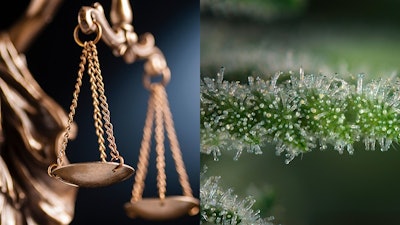
Once again, voters’ will to effectuate policy change via a cannabis ballot measure hangs in the balance of a state’s supreme court decision ahead of the general election.
Just months before the 2022 election, the Oklahoma Supreme Court has declared authority to decide whether State Question 820, an adult-use cannabis ballot measure organized by Oklahomans for Sensible Marijuana Laws (OSML), meets the qualifications to appear on the ballot in November. OSML advocates have dubbed their effort the “Yes on 820 Campaign.”
But cannabis ballot initiatives left in state supreme courts’ hands in other cases have historically not fared well.
Two years ago, the Nebraska Supreme Court sided with opponents that a medical cannabis legalization measure violated the state’s single subject rule and could not appear on the 2020 ballot. That decision came after a signature campaign received the green light from the secretary of state.
In Mississippi, the Supreme Court overturned its voter-approved medical cannabis ballot initiative six months after the 2020 election. And South Dakota’s Supreme Court overturned a voter-approved adult-use ballot measure roughly a year after the 2020 election.
According to OSML advocates, the Oklahoma Supreme Court justices announced Aug. 30 that they are deferring a final decision on the ballot question until after a 10-day protest period under state law. The news came as a short-term win for reform proponents, OSML Campaign Director Michelle Tilley said in an Aug. 30 press release.
“We are thrilled the Court has officially recognized State Question 820 has more than enough valid signatures to be considered for the November 2022 ballot,” Tilley said. “It appears the Court is giving itself the opportunity to order State Question 820 on the ballot after we pass the protest period. We are confident that our more than 117,000 valid signatures will pass the 10-day protest period and are optimistic the Oklahoma Supreme Court will order State Question 820 on the ballot for the 2022 general election.”
OSML submitted roughly 164,000 signatures July 5 to Secretary of State Brian Bingman’s office, which certified 117,257 of the signatures on Aug. 22—surpassing the required minimum of 94,911 to land on 2022 ballot.
The signature verification process usually takes two to three weeks, according to OSML, not 48 days, like in the case of this ballot initiative. While those signatures were just validated last week, Aug. 26 was the deadline for the measure to be finalized, according to Oklahoma Election Board Secretary Paul Ziriax.
The 48 days it took to certify the 117,257 signatures for State Question 820 means there wasn’t enough time for the 10-day protest period to unfold before the Aug. 26 deadline. The 10-day period—a state statue allowing for opponents to challenge a ballot initiative’s validity—expires Sept. 1.
In turn, OSML campaign leaders filed an emergency lawsuit asking the Oklahoma Supreme Court Aug. 26 to exercise its constitutional authority to approve the ballot title and ensure State Question 820 is printed on the November 2022 ballot. The campaign’s legal action is the result of “a third-party vendor’s unprecedented slow signature count and absurd bureaucratic delays,” according to an OSML press release.
“We hope the justices will act quickly to protect the voting rights of all Oklahomans,” Tilley said in an Aug. 26 release. “In two short months, this initiative gained the support of voters in all 77 Oklahoma counties. The people of our great state expect to vote on cannabis reform this November, and we won’t stop fighting until their voices are heard at the ballot box.”
While the Oklahoma Supreme Court won’t make a final decision before the protest period expires on Sept. 1, the fact that the state’s top judicial body issued an Aug. 30 order assuming jurisdiction over State Question 820 left OSML leaders encouraged about their initiative.
Since Oklahoma has penalties and fines for frivolous challenges and lawsuits, according to OSML, the campaigns leaders remain confident that they will survive any such challenges.
“We are grateful for the justices’ thoughtfulness and expediency adjudicating this urgent matter, in accordance with Article V, Section 3 of the Oklahoma Constitution,” OSML Senior Campaign Adviser Ryan Kiesel said in the Aug. 30 release. “We will follow the remaining process laid out in the law, as we always have.”
If enacted by voters, State Question 820 will legalize cannabis for adults 21 and older, including the possession of up to 1 ounce of dried flower or 8 grams of concentrate. Also, individuals would be allowed to grow up to six mature plants and six seedlings at a time in their homes.
The state would levy a 15% excise tax on commercial adult-use cannabis sales, and the revenue would be split among the state’s general fund (30%), public school program grants (30%), drug addiction treatment programs (20%), a state judicial revolving fund (10%) and to municipalities or counties where the cannabis is sold (10%).
According to OSML, the ballot question also aims to:
- Protect the public health and safety of all Oklahomans;
- Provide common sense criminal justice reform and expungement for low-level cannabis offenses;
- Defend the rights and civil liberties of patients and adult consumers; and
- Increase revenue for existing, fully compliant medical cannabis businesses with limited licensing opportunities for the first two years of the program.

























